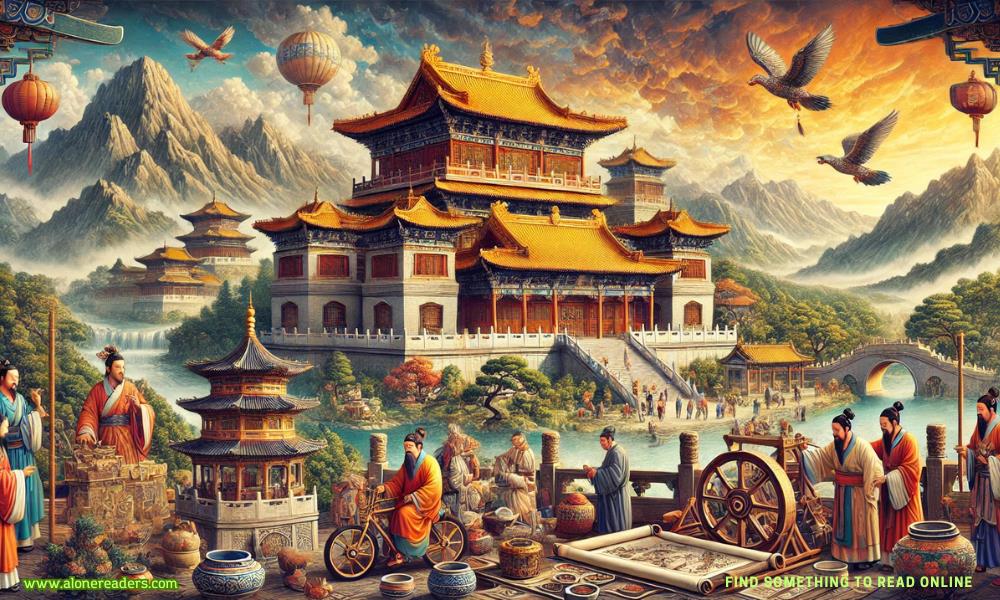Page 1 of The Splendour Falls
Prologue
…when all was lost or seem’d as lost…
The first night had been the worst. They had come on so violently, and without warning. One moment she’d been peacefully at prayer within the chapel, and the next the captain of her guard was pounding at the door, with orders she should seek in haste the safety of her chamber. And then someone had whispered “siege”…
It had been dreadful, that first night—the darkness and the shrieking of the wind and the fires burning everywhere, it seemed, upon the plain below. But daylight came, and still the castle held. Of course it held, thought Isabelle. This was Chinon. Like the Plantagenet kings it sheltered, Chinon Castle had a will of iron. It bowed before no man.
At first, she had not wanted to believe that Guillaume des Roches could be so bold, so callous, as to try to hold her hostage. He’d been an ally of the king her husband, and in return he had been used most fairly. Had John not made des Roches warden of Chinon? And yet she’d seen the evidence with her own eyes, she’d seen des Roches himself among the men, striding freely through their ranks as though such treason were a thing to make him proud.
If John were here, she thought, he’d teach the traitor otherwise. If John were here…
She drew the velvet robe more tightly round her shivering body and looked again toward the west. The sun had slipped much lower, now. Already it had flattened on the purple haze of hills, spilling its brilliance into the darkly flowing river. Soon, she knew, there would be only darkness left. Four nights now she had stood here in this high and lonely tower, watching while the dying sun sank weakly in the western sky. This time she found herself looking for the fires, her own eyes seeking out the places where the rebels kept their camps.
“They are quite close, tonight,” she said aloud, and one of her women stirred beside the hearth.
“My lady?”
Isabelle glanced round, her long hair tangling on the crimson velvet. “I said the fires are close, tonight.”
“Yes, my lady.”
“It must be very cold…” She looked away again, thinking on the madness that might drive a man to leave the comfort of his own warm hearth in this, the depth of winter.
Her women were watching her, she could feel their eyes. Her calmness, she knew, surprised them. They thought her still a child, as she had come to them three years ago, when John had brought her here, to Chinon, for the wedding. He’d scandalized the court that summer—she had heard the whispers. A man past thirty marrying a girl of twelve…
But even then, she had not been a child. She had already been betrothed to Hugh of Lusignan when John had met her first at Angoulême. No matter. As in the game of chess, a king outranked a knight, and Isabelle had known from their first meeting how the game would end. Some said that she yet wanted Hugh, but they were fools who thought so. In all her fifteen years, she had loved one man only—a quiet man, a caring man, with midnight eyes that smiled for her alone. And had it been her choice to make, three years ago, she would have chosen John.
He was not like his brothers, not like Richard. She’d met the fabled Lionheart—an armored giant with a beard of gold. The image of his father, people said, the image of the Lion himself, King Henry, that raging intellect who, with indomitable Eleanor of Aquitaine, had bred a line of princes unparalleled in time.
It was, thought Isabelle, the strangest family. They loved and hated one another, wept and warred and plotted, moving always in a weird diagonal between deceit and truth. It had left scars on all of them, especially John. He did not speak of it, but many times she’d seen him standing silent in the chapel here at Chinon, brooding on the very spot where old King Henry, sick at heart, had finally died.
’Twas rumored it was John’s fault that the Lion ceased to roar—John’s fau
lt because he had been Henry’s favorite, and because the king had seen John’s name upon a list of those who stood against him. But Henry’s heart was not so weak, thought Isabelle. He’d fought his sons before, unflinching. He’d dungeoned up his wife. He’d played John and betrayed him until no one could with any certainty say how his feelings lay. And yet John loved him. When he stood so sad and solemn in the chapel, Isabelle had but to look upon her husband’s face to know whose heart had broken there those many years ago.
Still, people would persist in rumors. They whispered now about young Arthur of Brittany, held captive in Rouen for laying siege to the old queen at Mirabeau. John had once been fond of Arthur, his brother Geoffrey’s only son, and Geoffrey, who died young, had been of all the brothers closest in both looks and age to John. But Arthur was not Geoffrey. Where his father had been cunning, Arthur failed to think at all, and his rash behavior left John with no option but to take him prisoner.
And so the rumors shifted, day to day. Arthur of Brittany was free… he was in fetters… he was planning his escape… he was too weak to raise his head… he had been moved in secrecy from Rouen… Some said—she’d heard it only yesterday—that Arthur was already dead, that John had had him killed. What foolishness, thought Isabelle. John could not kill the boy.
She might have told that to the men camped now around the walls of Chinon Castle, if they had been like to listen, since it was for Arthur’s sake that they had come. They thought to hold her hostage for the freedom of the reckless young pretender. Fools, she thought. They knew John not at all.
The wind struck chill through the high narrow window. It had a voice, that wind—half human and half demon, that numbed the soul and turned the heart to stone. Isabelle turned slowly from the dimming view and crossed the great round room to where a smaller window gazed upon the north. The northern sky was deepest blue and full of cloud, without a star to pierce the gloom. Did they have stars, she wondered, at Le Mans? Her message would, by now, have surely reached him. Le Mans was not so very far away. She had but to hold out a few more days, and help would be at hand. Isabelle smiled faintly in the firelight. Even if John had loved her not at all, she knew he would not lose his precious Treasury. Indeed, she might have thought he loved his Treasury above all else, had it not been for the day she’d teased him about it and he’d caught her to him, there in front of everyone, and told her: “You are my treasure.” She could still taste his kiss upon her lips…
Her hand moved, unthinkingly, to the gold and pearl pendant at her throat, and she frowned. “Alice,” she said quietly, over her shoulder, “I would have my jewel casket.”
“Yes, my lady.” The woman by the fire rose obediently.
“And Alice…”
“Yes, my lady?”
“Which of the servants knows the tunnels best?”
They did not need to ask which tunnels she was speaking of. Chinon Castle was riddled with them. John often said it was a mystery that the walls did not collapse.
“Old Thomas, my lady,” came the answer, finally. “He works in the kitchens.”
“Then I would have him brought to me,” said Isabelle, “without delay. I have need of him.”
The women stared at her, and murmured, but they knew better than to question her wishes. For all her youth, this waif-like figure by the window was yet Isabelle of Angoulême; she was their queen, and she would be obeyed. Old Thomas would be fetched with haste.
Content, Isabelle turned back to the small window and the fires burning brightly on the blackened plain below. She did not hear the door behind her close, nor hear the footsteps of the women ringing down the cold stone passage. She only heard the wind. She was still standing motionless, her eyes upon the northern hills, when Alice came to set the small jewel casket down beside the bed.
Alice was the oldest of her women, and her gaze fell very gentle on the sad-eyed little queen. “He will come, my lady,” she said softly, and they both knew it was not Old Thomas that she meant.
Isabelle nodded, without words, and blamed the stinging winter wind for the sudden trail of dampness on her face…
Chapter 1
…and thus a noble scheme
Grew up from seed…
“And did he come?” I curled my feet beneath me on the sofa, and poured another cup of tea.
My cousin was idly contemplating my sitting room window, where the raindrops chased one another down the panes in ragged paths. He pulled his gaze back to mine, with an effort. “What?”
“John,” I prompted, patiently. “Did he finally come to rescue Isabelle?”
“Oh.” He smiled. “Naturally. He sent his best knight, Jean de Préaux, with a group of mercenaries, to bring poor Isabelle back safely to Le Mans.”
I pulled a face. “How very noble of him.”
“You would have seen the romance in that, once,” Harry said, passing me his own teacup to be refilled. It was a gentle reprimand. He was quite right, I knew, but I pushed the thought aside.
“So tell me,” I said, “about this new theory of yours.”
“My dear girl, it isn’t theory—it’s been published in three quite prestigious journals.”
“Sorry.”
He forgave me, leaning back. “Well, you remember when they turned up that new chronicle last year, at Angoulême?”
“By William de What’s-his-name? Yes, I remember.”
- Praise Me: Princess by Jessa Kane
- Animal Instincts by Jenika Snow
- Captured By the Bratva by Ava Gray
- Devlin by Winter Sloane
- Cruel Honor by Ivy Davis
- Playing With Fire by Emily Hayes
- The Ballerina by Jade Marshall
- Frat House Fling by Stephanie Brother
- Use Me, Daddy by Sara Fields
- Snowy Secrets by Ajme Williams
- Fierce-Michael by Natalie Ann
- Forever His This Christmas by Rosa Mink
- Trust Me With Forever by Kayla Chase
- She's Got that Fire by Haley Travis
- Savage Mountain Man by Lilah Hart
- The Way You Hurt Me by Emm Darcy







